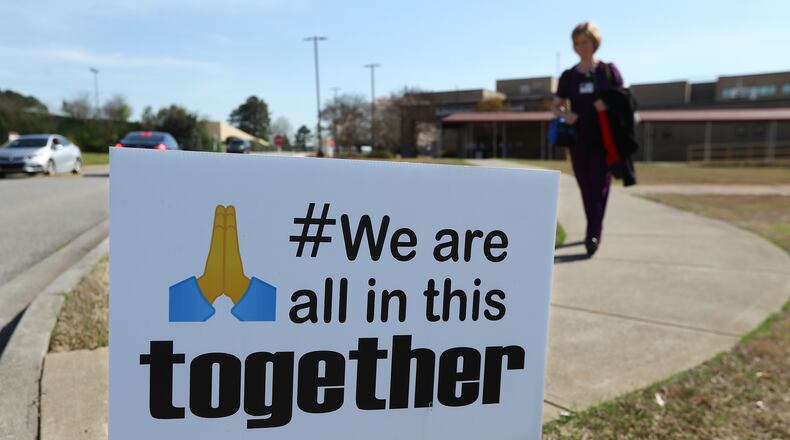As the calendar turned to the month of March, Scott Chadwick and Oliver Halle were at it as usual, beating up each other on Facebook about politics.
Chadwick, a retired tax administrator and former Cobb County commissioner, was pretty far to the right on the political spectrum. Halle, a former FBI agent, sits on the other side of that divide.
On March 1, Chadwick wrote: “Bernie (Sanders) says, ‘We are not a campaign; we are a MOVEMENT!’ He’s right! A BOWEL movement!”
Halle responded, “Class act, ScottyBoy. Your mantra should be like the limbo — how low can you go?!”
The next day, the state announced an Atlanta area couple had tested positive for coronavirus. They were the first cases diagnosed in Georgia.
A few days later, Chadwick was blasting the old FBI man, again, about politics. Talk about the deadly virus hadn’t yet overtaken public discussion.
“That is so trite, hackneyed and threadbare,” Chadwick wrote about one of Halle’s opinions. “Can’t you come up with something less banal?”
Halle responded, “I kept it simple so that your simple mind would comprehend it.”
“We went real hard at each other,” Halle told me this week. “Scott never let facts get in the way of his opinion. But it never got into the way of us being friends.”
COMPLETE COVERAGE: CORONAVIRUS IN GEORGIA
Both were Vietnam veterans and both shared a friendship at Marietta Kiwanis Club meetings. It was at such a meeting on March 12 that they saw each other for the last time.
At that meeting, Cobb County Commission Chairman Mike Boyce was the guest. But he wasn't there for the usual pleasantries.
“His entire presentation was about coronavirus and how we had to deal with it,” Halle recalled. “He didn’t smile. He didn’t laugh. He told it like it was. He said, ‘People, this is serious. This is not going away.’ He scared the crap out of people.”
At that point, it was beginning to sink in to most Americans that this coronavirus thing was for real. Not just a China thing or an Italy problem or even a Washington state deal. That same day, Georgia recorded its first COVID-19 death. It happened in WellStar Kennestone Hospital in Cobb, just up the road.
A week later, Chadwick fell ill and ended up in that same hospital. He was diagnosed with COVID-19. "He got sick quick," said Johnny Walker, a Marietta City Council member and fellow Kiwanian. "But then he was off the vent and doing better. And then I heard that he had died."
Walker described Chadwick as a “man’s man.” But such fortitude could not save him. His wife told the Marietta Daily Journal he never had a chance once the disease attacked his lungs. The 82-year-old suffered from chronic obstructive pulmonary disease, or COPD.
He died last Friday. A service is being postponed, as are most these days.
“Scott was one of those rarest people these days,” Halle said. “There was such a wide gap in our differences but we still got along so well. I’m going to miss our fights. And so will a lot of other people.”
As the daily coronavirus count explodes and as April enters the scene, more and more Americans personally know someone who either has been infected or is likely to be infected. Increasingly, folks know or know of someone who has died. Or we certainly will.
On Tuesday, Atlanta Mayor Keisha Lance Bottoms had a teleconference briefing with Atlanta City Council members, telling them, “This pandemic is hitting home. I know a number of people who are very sick. … Everyone knows someone who is sick.”
PHOTOS: Metro Atlanta adjusts to coronavirus
PHOTOS: Hartsfield-Jackson in the COVID age
Councilman Michael Bond said an aunt of his had died, as had a community volunteer who was his friend. He then asked the mayor to shut down parks and the Beltline because people are not paying heed to social distancing.
Bottoms said she has not yet gotten that recommendation from health officials. She’s been conferring with Emory infectious disease expert Dr. Carlos del Rio as she decides what must be done. But, the mayor added, things have been shifting quickly.
Credit: JOHN SPINK / AJC
Credit: JOHN SPINK / AJC
Life has shifted quickly for all of us. Unemployment has exploded, rush-hour roads are vacant, health care professionals are being worn down, and society holds its breath to see what each day brings.
Now it is April, a month that del Rio wants to disappear for Georgians. "I tell people my phrase is, let's erase April," del Rio said. "The most important thing we can do is stay home. Staying home saves lives.
“I really think by early May we’ll be fine.”
This week, del Rio cited a study that said COVID-19 deaths in Georgia should peak April 23, with an estimated 84 people dying on that day. It should be noted that it took more than two weeks for the first 84 deaths to occur here, an indication of the exponential growth.
The April estimate is a ghastly Bell Curve that means in the days before the 22nd, there will be days with perhaps 62 deaths, then 70, 75, 84, then 78, 70, then down to single digits by June. And then, eventually, none. Of course, we really have no idea.
The predictions come from the Institute for Health Metrics and Evaluation, which says the state will also have a shortage of 755 intensive care unit beds on April 22. It's a number that is pretty precise for an educated guesstimate.
This week, the White House coronavirus response coordinator, Dr. Deborah Birx, estimates “100,000 to 200,000 fatalities,” that is, if things “go perfectly.”
Think about that: 200,000 deaths. If things go … PERFECTLY.
Oh, to be back to the days when our worries were just some political sniping.
About the Author
Keep Reading
The Latest
Featured








